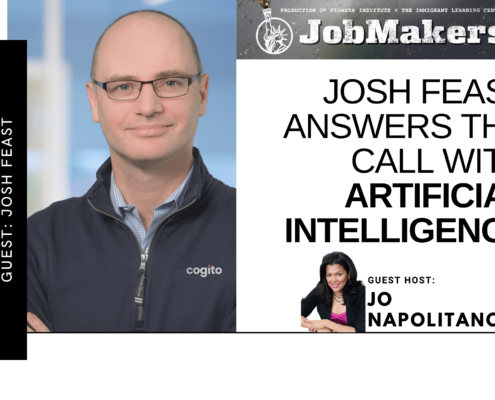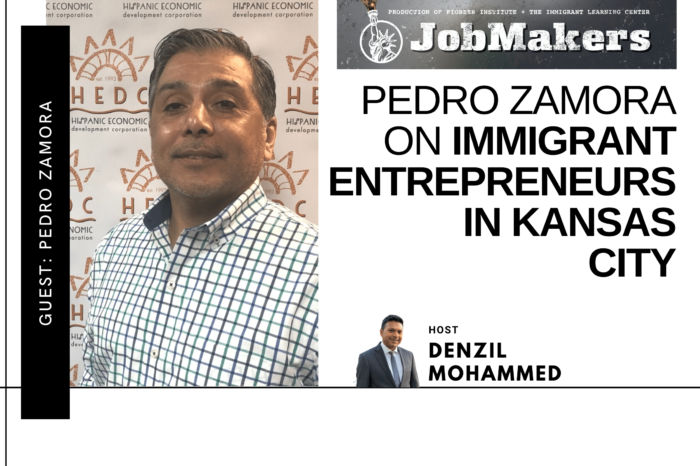Pedro Zamora on Immigrant Entrepreneurs in Kansas City
/in Economic Opportunity, Featured, JobMakers, News /by Editorial StaffThis week on JobMakers, host Denzil Mohammed talks with Pedro Zamora, executive director of the Hispanic Economic Development Corporation of Greater Kansas City. Pedro and his organization work on initiatives that are crucial to the economic vitality of the area, and they’ve helped more than 4,700 businesses. Immigrants there are having an outsized economic and cultural impact, and so Kansas City is yet another example of how localities can bounce back and benefit from immigrants and refugees, as you’ll learn in this week’s JobMakers podcast.
Guest:
 Pedro Zamora is the Executive Director of the Hispanic Economic Development Corporation of Greater Kansas City. He brings over 34 years of leadership experience, in both the corporate for-profit and not-for-profit worlds. Pedro previously held leadership positions in research and development in the telecom industry. In 2007, he founded and served as CEO of Kyland USA, an industrial Ethernet communication manufacturer. Pedro has experience in R&D, product development, traditional manufacturing organizations and has international sales and marketing experience. Selling the company in 2014 allowed Pedro to enter his second leadership chapter as a nonprofit executive. Pedro has dedicated his leadership energies to improve business relationships, and economic impacts of the Latino community and business in the Greater Kansas City Metropolitan Area.
Pedro Zamora is the Executive Director of the Hispanic Economic Development Corporation of Greater Kansas City. He brings over 34 years of leadership experience, in both the corporate for-profit and not-for-profit worlds. Pedro previously held leadership positions in research and development in the telecom industry. In 2007, he founded and served as CEO of Kyland USA, an industrial Ethernet communication manufacturer. Pedro has experience in R&D, product development, traditional manufacturing organizations and has international sales and marketing experience. Selling the company in 2014 allowed Pedro to enter his second leadership chapter as a nonprofit executive. Pedro has dedicated his leadership energies to improve business relationships, and economic impacts of the Latino community and business in the Greater Kansas City Metropolitan Area.
Get new episodes of JobMakers in your inbox!
Read a Transcript of This Episode
Please excuse typos.
Denzil Mohammed:
I’m Denzil Mohammed and welcome to Jobmakers.
Denzil Mohammed:
I have some really special memories of Kansas city, Missouri there. I had the warmest sweetest churros, the most incredible barbecue, of course, and even gourmet handmade chocolates from a Swiss confectionary topped off by watching a beautiful Chinese dragon boat festival. In 2000, immigrants made about four and a half percent of the Kansas city Metro area population. By 2019 that had grown to 7%. And importantly, the area’s immigrants had $3.5 Billion dollars in spending power – more than 80% of them were in their prime working age. And there were more than 11,000 immigrant business owners. For Pedro Zamora, executive director of the Hispanic Economic Development Corporation of Greater Kansas City, these immigrant entrepreneurs are increasingly crucial to the economic vitality of the area. Not only are they powerful economic drivers and job creators, the wealth of cuisines, cultures and art make the area vibrant, exciting, and flourishing. Pedro and his organization work to develop and implement economic development initiatives that contribute to the quality of life for Latinos in the greater Kansas City area. And to date they’ve helped more than 4,700 businesses and immigrants. They are having an outsized economic and cultural impact. And so Kansas City is yet another example of how localities can bounce back and benefit from immigrants and refugees. As you learn in this week’s Jobmakers podcast,
Denzil Mohammed:
Pedro Zamora, executive director of the Hispanic economic development corporation at Kansas city, Missouri. Welcome to the Jobmakers podcast. How are you?
Pedro Zamora:
I’m doing well this morning, Denzil, thank you for the invitation.
Denzil Mohammed:
So tell us a little bit about the Hispanic economic development corporation and the kind of work that you do and the people that you serve.
Pedro Zamora:
H E D C, the Hispanic economic development corporation, was founded in 1993 for the sole purpose as a pass through entity to receive $30 million of EPA environmental protection agency dollars to clean up a brownfield site, a 26 acre brownfield site in the heart of the Latino community here in Kansas city, Missouri, there were several nonprofit organizations that were doing social work and education and health, but no one was addressing the environmental contamination. That was right in the heart of our neighborhood as a child used to play in that area and throw rocks and break windows and things like that. Little did I know what the toxicity ground we were walking on. And then mayor Manuel Cleaver was a great friend of the Latino community pulled together some grassroot leaders and formed HEDC to give us ownership and the right to organize, to get the community and the business industries to come to the table to talk about what should we do at this location? It was an abandoned railroad maintenance yard. And today it’s home to a high tech warehouse that employs the roughly 600 employees from across the city, about 375 of those employees come from our neighborhood still today.
Denzil Mohammed:
Wow, that’s terrific. And so bring us up to today, the work that you do now, and the kind of impact that you had,
Pedro Zamora:
The Latino population in Kansas city began in the west side and it’s grown into all 17 counties. We, we see a 33% increase in the past census track census that was completed a 33% increase in a 10 year cycle of Latinos migrating into our greater Kansas city metropolitan area. HED C’s responsibility is definitely focused in the entrepreneurship development. We couldn’t do just entrepreneurship development unless we took a snapshot of that individual and got them comfortable with what, where the world’s going today. Online today, we focus on our digital literacy, integrated financial and business training. Our clients don’t come in for one siloed initiative activity it’s integrated and through our modularly designed program where we take the client through a very interesting wake up call of assessing themselves in the first 12 hours of our program, if they come into a 40 hour program, they’re gonna take 12 hours to think about who they really are.
Pedro Zamora:
They’ll turn on the computer and they’re gonna be responsible for capturing their own story and then build out their strategy of where they want to go and who they wanna bring with them are through this model of helping the individual reestablish trust in themselves, trust with our organizations we find a common theme amongst all our clients, and then we create these small cohorts. So these cohorts can now trust one another and stay together and, and become part of the community and create their own community in their community. So if that, if you can see, we’re just trying to put people together to help them support one another and support other folks within the community to elevate them. We don’t market. All our services are done, word of mouth. And we’re pretty busy.
Denzil Mohammed:
That’s not uncommon because the immigrant British center has a free English language program. We’ve never had to advertise.
Pedro Zamora:
Yeah, that’s fantastic. And
Denzil Mohammed:
We, and we always have a waiting list of several hundred, sometimes over a thousand. So immigrants and, and again, counted to the prevailing narrative of not wanting to do an English, not wanting to integrate immigrants are signing up. Right.
Pedro Zamora:
Well, the interesting part about our focus is we do not want to be known as an English learning facility because our clients don’t have the time to learn and to master the English language because they’re trying to survive as they’re building and scaling their business. They’re surviving as well as their employees. So we just don’t touch the business owner. We touch the employees of the business owner. We have relationships that tell them, bring us in before your restaurant opens up. We’ll give you two hour training and financials, digital literacy communications to the school systems. So the workers are talking to the schools and learning about the students, looking at the reports. So it’s a, it’s, it’s, it’s pretty in depth, the importance in taking 100 words in business finance marketing concepts, and building off those 100 words in these categories has proven and has now taken our clients to well over 2000 words in each one of those categories. So their conversation learning is, is definitely built beyond that.
Denzil Mohammed:
So therefore, describe to me the entrepreneurial ecosystem in areas that you serve, who are the job makers, what kind of businesses do they have? What are they like? Where do they come from?
Pedro Zamora:
Well, well, the high, the high number of job makers are always those fantastic restaurants that we get frequent from time to time. And the though those restaurants are no longer the text me style. You’re, you’re seeing everything from seafood to really unique dishes. We have a lot of local, I call ’em food artists that are coming in with delivering fantastic cuisines that was pre pandemic during the pandemic. They had to rethink themselves. Restaurants got closed, keep in mind. The first round of assistance from the federal government did not include non-US nationals. They weren’t a part of that help assistance. So they had to rethink themselves. So popup restaurants and pop up markets have popped up in our communities across the city in Kansas city, Missouri and Kansas city, Kansas. And it’s a different menu, but the street tacos are still prominent there.
Pedro Zamora:
The second largest industry, we see that we support both with our financial business development training, and as well as our loan portfolio that we lend to through our C D F I fund, we’ve seen a lot of landscaping yard maintenance companies come to fruition. And then the, of course, the third one that’s high in numbers and high employer is our structure field. We, we, our job is to try to move them out of those three high in, in industries and to try to get them into coding or other forms of business work. We’ve are accomplishing this through our integrated digital literacy courses that we teach. We have three courses certified by the us department of labor, as well as our university of Missouri school system, postsecondary educational system. These are career stackable credentials, and they go into financial processing entrepreneurship, financial management, risk management, learning all the Microsoft Excel tools.
Pedro Zamora:
And then we have a third one that is for networking becoming a, a network using these modern skill sets that will help the first generation or a second generation, a family that has a second generation within their, their business model to think of the new industries that they would like to expand in. Now that they’re comfortable with their operating capital, they should be thinking of a secondary market to spread out their risk in earned incomes. What we saw during the pandemic is if you have mom and dad and the children all working in the restaurant, it was very painful during the pandemic. What we did in 2020 was take 77 small businesses that were in the restaurant industries that we knew were not getting support from the federal government on our local reliefs assistance programs. And they spun up some cons. They had to go back. As I mentioned, we’d like to see a move into the technology sector. We took ’em back into the construction market. Now they, the men were now back in the construction field, the women were waiting to see if the restaurants were gonna be able to reinvent themselves and due to go orders as, as the regulations opened up. Now, we’re having these families, these business owners think of how they can bounce their risk of where they’re gonna earn their income, the conversation doesn’t stop there. They’re still looking at the technology.
Denzil Mohammed:
What are some of the success stories that you can tell us about some of your favorite businesses perhaps, or some of the the businesses that really grew into the ways that you wanted them to?
Pedro Zamora:
I would say those 77 families were a great success, but they’re not just businesses. The individuals are ones that we really are making an impact with. And one great success. I can use his first name, Josh. He was 82 when he started working with us, could not read or write in his native language. Spanish had lived in had, had worked in the agricultural field, picking fruits and vegetables his whole life while he was in the United States. And never learned to read or write in English for Spanish. We were introduced him to him during our, a research development phase of our digital literacy program through a parents’ teachers program. He had no children, but he was the only live and survivor of his niece and nephew that his third parents got killed in an auto accident here in Kansas city.
Pedro Zamora:
And Joshua became the the parent to raise these kids. He had to learn real fast, how to extend his skill sets and communication using technology. We were able to teach him how to read and write in English and in Spanish. Joshua is today, he’s probably 85, 86. The kids are doing great in high school today. But he’s dealing with dementia early stage of dementia, but using technology, he keeps his mind refreshed. And that to me, if an is to take an individual who has sacrificed so much and has life to work and grow his assets, his net worth, but then also to be put in a position where of the unknown raising kids it’s an amazing story in how he has been able to communicate better with his doctors, better with extended family members and his community. He’s been a leader. We call him one of our lits, Latino and technology. He’s one of our leaders. He, he gives a great speech, very articulate individual.
Denzil Mohammed:
So a lot of what you’re talking about, tap taps into the American dream, this concept you state explicitly that your organization is an institution that significantly contributes to enabling the Latino community, to realize its full participation in the American dream. How alive is the American dream among the people you serve
Pedro Zamora:
A great question. It is an amazing observing how we go about measuring that. Economically there’s not one individual that we run across. That’s either documented or undocumented that do not wanna show that they’re paying their fair share. And we help them achieve that with our online bookkeeping platform, as well as the financial risk management courses. Not all businesses are perfect. We, it was tough during the pandemic and it was even more important to see how their financials were in order our community, the Latino community, the immigrant community. They trust very few people, but they trust their churches, their families, and they trust the first kid that may go get financing 1 0 1 done at college or high school <laugh> and they become the, the financial leader. What we saw the American dream is live and working, but if they really wanna participate, we gotta get their financials and their tax consequences in order to, and I, I honestly will sit here and tell you that 100% of every person that we talk about in the financial business as an entrepreneur in the Latino community, want to fully pay their way.
Pedro Zamora:
They’re not here to cheat the system. They’re not depending on the system, they can’t get access to the system. So the American dream to them have a good tax return submitted <laugh>. So those are words that I can’t pull out in my head. I, we had a pop up this past Saturday 35 small businesses. The temperature was well in its nineties. Humidity is high, but these folks were having a fantastic time and, and getting a chance to meet some of them for the first time and visit with them. They, they showed their ledgers that they were keeping on their phones and whether they, they were using an on an online FinTech product or not, they were keeping sure they wanted to make sure they were tracking their expenses and their earnings for that day.
Denzil Mohammed:
You raised a really important point there that undocumented immigrants really want to be, to pay their fair share to be on the straight narrow. I remember experiencing that heat of humidity in June, in Kansas city was not pleasant. But I also was there when they had this beautiful Chinese dragon festival one day, I think it was a Saturday in Kansas city. Can you talk about the broader demographics of Kansas city? You mentioned the change in just 10 years in the Latino population and how are the different groups getting along? It’s pretty diverse, right?
Pedro Zamora:
It’s very diverse. We have one sec sector of our community, which is the Northeast of not far from my office here, Northeast it’s called the Northeast neighborhood. Independence avenue has roughly 69 different countries represented on that corridor. It’s about a three mile corridor. And that’s where the immigrants settle. That’s where they start their businesses. They go to these vacant storefronts and they pull their money together and they begin their journey of contributing. And they’re settled by other NA nationalities from their country and who take these old homes. And they start refurbishing these old homes. What happens then is that they they get along together, but what happens other high investors want to come into those communities cuz they see the economic boom that’s taking place there and it’s eclectic. It becomes desirable and they start using their high level dollars and powerful lawyers to come in and work with our city to be, to talk about building other forms of development projects in those communities. So it’s a challenge, it’s a double edged sword. So it’s not the immigrants that don’t get along. It’s the system that once we do good and once we stabilize the community and we uplift a community, then it’s that gentrification steam shovel that comes rolling over right behind us, very close it’s happening faster and faster with us today.
Denzil Mohammed:
One thing that Americans take for granted is the tremendous variety of cuisines and cultures that we have access to. We really take for granted that we can have Thai food tonight and Mexican food tomorrow and, and you know, Ethiopian food the following day the most popular, fast food chain hair is taco bell first crying out loud. Can you speak a little bit to the value of all these? You mentioned all the different kinds of cuisines that we’ve had. I remember having the best chores of my life in Kansas city and then having Peruvian food from somewhere else. What is the value of, of that kinda diversity to the United States?
Pedro Zamora:
It’s see, it’s, it’s an amazing journey to, to come down independence avenue or Southwest Boulevard or Minnesota avenue today in central avenue, these corridors are known for their diverse cuisines and you, you can go from TexMex all the way to enrich seafood dishes out in Mexico and other Latin American countries. We don’t have any national franchise change like the wonderful taco bell you mentioned. And we, we have to go out of our community to go there, which is a blessing. It, it’s a blessing to have everything from a to Z in the cuisine space in these communities. We’re talking about the it’s important because life journey experiences are pretty exciting when you don’t have to leave, you know, you can go five miles and you’re hitting all these very eloquent dining experiences. And that’s important because we all are, are struggling in from the different ethnic groups that we are settling in, but we have one common theme family and creating community. And, and if we can maintain that cultural arts and demonstrate the economic impacts that we bring with that I think folks really find it a journey when they come visit our communities.
Denzil Mohammed:
Your role in immigration story goes back really far back. Would you mind just sort of sharing your immigration story?
Pedro Zamora:
Yeah, I’m, I’m a son of an immigrant family. My, my dad was born in Mexico and brought into the United States, even though my grandmother had already been living in the United States since the early late 18 hundreds and early 19 hundreds. My grandmother arrived in the late 1890s into Kansas city. She settled here. There was an unrest in Mexico and she was my, my grandfather and her were just victims of being the landowners that were, they had to do something. And they came to Kansas city because of the railroad, the railroad, on my dad’s side, my ancestors are all railroaders on the men’s side. My mom is a third generation, Nebraska and Latina. Who’s in a migrant family. So there’s three generations of migrant workers that finally obtained success and bought farm land in, in Nebraska. And that’s how my grandfather raised 21 children in Nebraska on my mom’s side. So I’m a sibling of 17. I’m one of 17 in my family with my parents.
Denzil Mohammed:
And it’s what makes this country special. It really is. And the fact that we all have these common threads despite of incredibly diverse backgrounds, thank for sharing the, about the diversity of Kansas city and your even your own immigrant story. We all have these immigrant stories, whether they’re short or long Pedro Zamora executive director of the Hispanic economic development corporation in Kansas city, Missouri. Thank you so much for joining us in Jobmakers.
Pedro Zamora:
Denzel, thank you for the invitation. It was my pleasure
Denzil Mohammed:
Jobmakers is a weekly podcast about immigrant entrepreneurship and contribution produced by Pioneer Institute, a think tank in Boston and the Immigrant Learning Center in Malden, Massachusetts, a not-for-profit that gives immigrants a voice. Thank you for joining us for this week’s story on how immigrants are building up Kansas City. Remember you can subscribe to job makers on apple podcast, Spotify, or wherever you got your podcasts. And please leave us a review. I’m Denzil Mohammed. See you next Thursday at noon for another Jobmakers.
Recent Episodes:
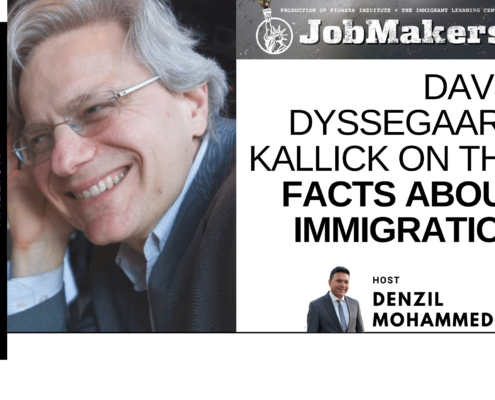
David Dyssegaard Kallick on the Facts about Immigration

Ely Kaplansky Goes from Immigrant to Inc. 5000 Insurance Entrepreneur
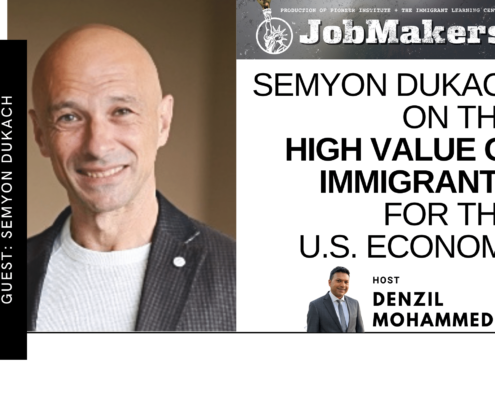
Semyon Dukach on the High Value of Immigrants for the U.S. Economy
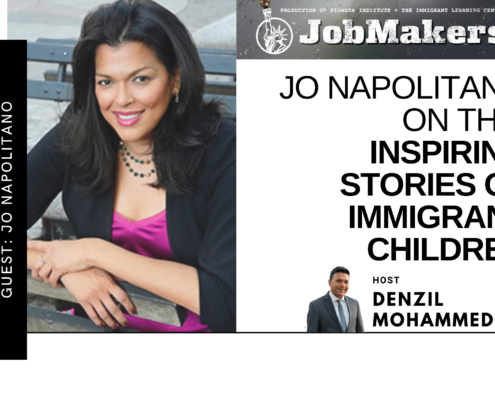
Jo Napolitano on the Inspiring Stories of Immigrant Children

Umesh Bhuju Seeks a Fair Deal for Immigrants, Farmers & the Environment

Dr. Babak Movassaghi on Winning in Football & Healthcare Innovation

Jitka Borowick on Starting a Small Business during COVID
